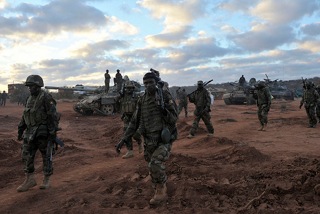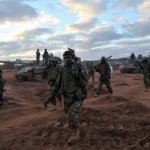
The value of strategic patience in Mali
The casual observer of events in Mali could be convinced that the almost daily developments in the military campaign, now in its “ultimate phase” according to the French President, reflect an unstoppable momentum towards stability in the West African state. As visible as that progress is, the United States should not be distracted from attaining its own far more prosaic and long-term goals in the region.
Undoubtedly, the French-led military campaign has delivered success after military success, most recently in destroying a key base of the AQIM, which will allow it to leave with its head held high. And few doubt that the military offensive, now successfully including an alliance of forces from across West Africa, was an urgently needed part of a strategy to halt the decline of the Malian state and stall the rise of regional criminal and militant groups.

Ugandan soldiers, operating under the African Union Mission in Somalia (AMISOM), during a recent operation towards Buur-Hakba joint with the Somali Army. It is still early days to assess how effective the African-led Mission is working with the Malian Army. AU-UN IST PHOTO / STUART PRICE
Yet, as the French intervention winds down, visible quick-wins in the military campaign must not be used to substitute what is really needed. Equal effort is required to patiently build similar momentum behind a comprehensive political process to address the country’s woes.
These ambitions that can only be achieved through dialogue – inside Mali and in the region – and is what will stand the United States in good stead for decades to come in terms of generating self-reliant regional stability, securing oil supplies, preventing repeated humanitarian catastrophes, and reducing the risk from international terrorism and organized crime.
The so-called Islamist offensive at the end of last year was the latest expression of a chronically weakened state, where an influx of arms and fighters from Libya and a transnational drugs trade with government links exacerbated – rather than caused – a pre-existing sense of instability.
Although they were militarily strong enough to push aside the National Movement for the Liberation of Azawad (MNLA), the various extremist Islamist groups do not attract as much popularity as the secular northern secessionist movement.
The social and political divisions in Mali run deep. As the United Nations has stated, in order to address Mali’s failing state and dislodge the Islamic militants permanently, it will be necessary to tackle the decades-old sense of inequality and political marginalization in the north, which have been historically papered over with short-term deals with Bamako. It is also important to re-build the legitimacy and effectiveness of the country’s institutions.
When AFRICOM acknowledged its failings in training the Mali forces, it was being pretty hard on itself. The human rights abuses perpetrated by Malian forces in the wake of the French offense seem to reflect ingrained political and ethnic divisions in the country, much more so than inadequacies in military training. Addressing these issues, together with issues around rule of law, corruption and legitimate authority, will take time and a lot more than a new training manual.
Last December, prior to the arrival of French troops, the interim Prime Minister had been forced to resign. Some even reported that the French intervention staved off a coup that was brewing in the capital, belying the fragility of civilian governance, the weakness of the existing constitutional arrangement, and the power the military exerts over the political structure.
Some analysts express concern that the African-led International Support Mission will have difficulty in replacing the 4,000 departing French troops. The Mission faces a multitude of challenges in prosecuting its security objectives. Western experts have been surprised by the weakness of the Malian forces and the realization that training and equipping them will take longer than previously calculated.
Timescales set for the still new African-led International Support Mission to deliver progress are incredibly short, given the ongoing fighting. Last month’s announcement by the Malian interim government for Presidential elections to be held on July 7th seems to be more of a promise of goodwill rather than an achievable goal.
It is clear that a comprehensive political path to tackling the schisms, socio-economic tensions, and humanitarian situation urgently needs to be ramped up even and deadlines for delivery may need to change. Previous attempts at north-south reconciliation or even socio-economic development have come to little but that does not mean they are not needed.
Recent reports of discussions in France with the Malian government on post-war planning is an important step forward, as are talks aboutdiscussions between the MNLA and the Malian government, but the political track needs to be pursued seriously and with a sense of patient perseverance
Last week, the African Union peace and security council endorsed the adoption of a political roadmap towards the elections, created by the Mali government, urging its implementation. While pressure must be bought to bear to ensure action, deadlines will need to be practical and must not be distorted by a Western-driven desire to see a short-term solution at the cost of longer-term stability.
No doubt, the United States has been encouraged by the results delivered from the African Union force in Somalia where a new constitutional arrangement and leadership seems to have ushered in an era of calm. Those expectations must be tempered by memories of the long and painful journey – militarily and politically – undertaken by the African troops and the Somali people.
Moreover, any comparison needs to be sensitive to the different realities, and expectations, on the ground and among the international community. Somalia had been the very essence of a failed state, an entire generation having experienced little else but conflict, where there was virtually no secure space for a non-violent debate about the country’s future. Although Mali is about turning around an ailing state, the political, social, humanitarian and security challenges and complexities are just as great, and intertwined.
As discussions turn towards a United Nations peacekeeping mission for Mali, and as President Hollande announces French troop withdrawal will start next month, the United States must redouble efforts to encourage and ensure genuine Mali debate on future governance, security, and economic arrangements that will benefit the whole country and generate long-term stability.
For background, read our fact-sheet on Mali here






[…] The value of strategic patience in Mali […]